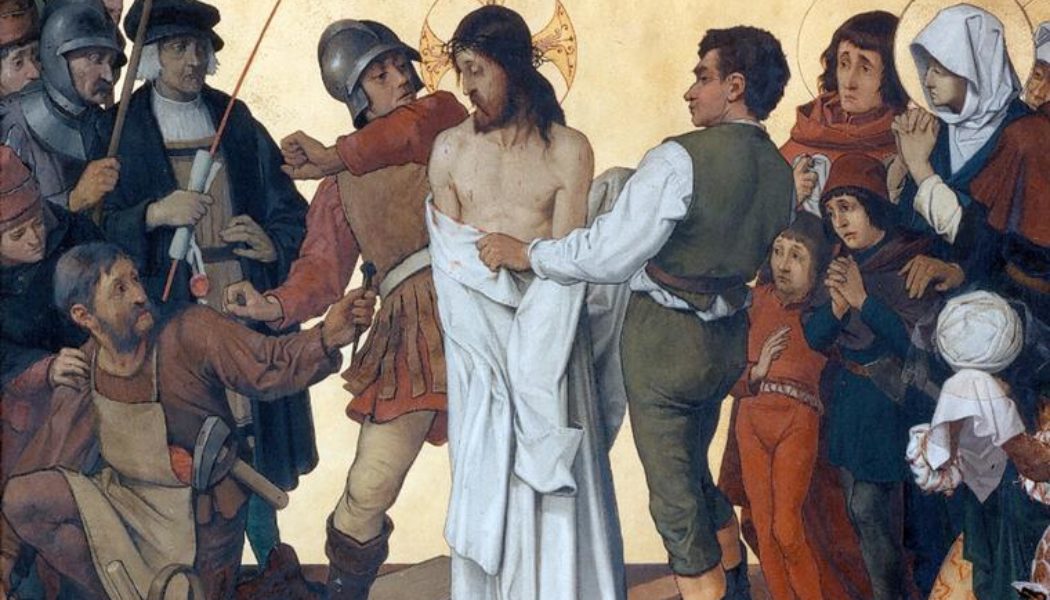
“If the sick person is too ashamed to show his wound to the doctor,” said St. Jerome, “the medicine cannot heal what it does not know.”
“The morbid thing is to conceal your sins and let them eat your heart out.” —G. K. Chesterton
There are numerous milestones in nursing school. Probably the biggest is the first shot: Plunging that sharp, hollow needle into a stranger’s muscle or subcutaneous tissue, infusing some potent chemical compound ordered by the physician, and then safely disposing of the used syringe to avoid a dirty needlestick injury.
Phew! Glad that’s over with!
There are other memorable milestones, especially the first time you’re called on to bathe a patient, particularly of the opposite sex. For my entry-level nursing students, I insist that they get over that hump in their first clinical rotation. “Have you all helped with a shower or a bath?” I’ll ask my crew after a few weeks in the nursing home. “Make sure you get in there and assist a naked stranger as soon as possible.”
It’s awkward, it’s embarrassing, but there’s no way around it: Getting accustomed to the “full monty” is definitely a required stop on the nursing train.
It’s not all that different, I suspect, for young priests getting used to hearing confessions. Sometimes you’ll get pious penitents who’ll only expose a bit of venial this and venial that, but then other times maybe you’ll get the Gypsy Rose Lee special — a veritable strip show of moral failing that leaves the recent ordinand shaking his head.
Eventually, however, confessors develop moral calluses to such revelations and they get used to them. As Chesterton’s Father Brown famously intimated, priests who’ve heard a lifetime of confessions are shocked at nothing. “Has it never struck you that a man who does next to nothing but hear men’s real sins,” the clerical sleuth tells a master criminal, “is not likely to be wholly unaware of human evil?” The Sacrament of Penance can become the most routine and mundane of priestly duties because, as the author of Ecclesiastes put it, there’s “nothing new under the sun” — including ways of transgressing the moral order.
That’s good news for penitents, for if our priests have heard it all, then so has the Lord. Consequently, we have no excuse not to strip our souls naked before God in the sacrament — something that’s not only normal but expected. Maybe it’s true, as Florence Nightingale advised, that nurses should take care when bathing their patients “not to expose too great a surface at once.” Yet, in the spiritual realm, total nudity is a must.
And, frankly, Jesus himself anticipated this reality for us when he acquiesced to a public disrobing — a moment memorialized in our churches at the Tenth Station of the Cross: Jesus is stripped of his garments (Matthew 27:33-36). Obviously, our sinless Messiah didn’t require a disclosure of wrongdoing like we do. Still, the pain we experience in the booth likely had its parallel on Calvary. “The inner garments adhered to his lacerated flesh,” writes St. Alphonsus Liguori, “and the soldiers tore them off so roughly that the skin came with them.”
Caryll Houselander goes further and highlights the excruciating emotional pain involved in this horrendous episode:
He stood there naked in front of the world and in front of His heavenly Father, identified with all those sinners who are found out, whose shame is made public, or, perhaps more terrible for them, shown to those whom they love and from whom, above all others, they would wish to keep it secret.
Ouch.
In truth, this is how many adult converts remember their first confession, especially after lifetimes of screw-ups and sin. Like armored onions, we required God’s help to rip away layer after layer of self-defense and rationalization before finally uncovering our hidden cores in want of cure. Our affinity for a stripped Savior runs deep.
So it is that I regularly turn my attention to the Tenth Station in church. In fact, in my parish, it’s right above the primary confessionals, and so we penitents line up right underneath it — a benefit if we take time to meditate on its imagery as we wait our turns. It’s a graphic illustration of what we’re all called to do once we’re at the grill: Bare our souls and cast off all our sins — especially the most egregious, humiliating, shameful ones — or else we’re just wasting our breath and the priest’s time.
In this, I’m reminded of Damien De Veuster, the Belgian priest and missionary who became the “Apostle to the Lepers” on the Hawaiian island of Molokai. Father Damien volunteered to live among the quarantined inhabitants of the island colony to selflessly attend to their needs (spiritual and otherwise), knowing full well that he was forfeiting the privilege of re-entering general society.
Indeed, shortly after landing on the island in 1873, Hawaiian health authorities ruled that anyone visiting the leper colony had to stay there — permanently. Consequently, Father Damien was deprived for a time of the sacrament of confession: No priest could go ashore for a sacramental stopover, and Father Damien was forbidden to leave.
In time, the provincial of Damien’s religious congregation traveled to Molokai for a pastoral visit, but the captain of the provincial’s ship refused his request to go ashore. Damien himself, who’d rowed out to meet the ship, was similarly rebuffed in his request to come aboard. “Father Damien stood in the little boat, so near and yet so far,” writes Mary Reed Newland. “Quickly he made up his mind. ‘Very well, I will go to confession here.’ And with his provincial leaning over the railing on the deck, the priest confessed his sins and received absolution.”
That meant that anyone on the ship within earshot could hear the holy cleric’s confession — now that’s spiritual nudity! It is said that Damien chose to declare his transgressions in French to his fellow countryman, and that few if any on board would’ve understood their delicate exchange. Still, does it matter? Isn’t it hard enough to confess — to verbalize our stark brokenness — when we know that nobody but Christ himself (in his priestly representative) can hear us? Imagine the fortitude and faith impelling a man to shout out his failings before a ship full of sailors. Imagine the confidence he’d have to have that it was worth it.
Oh, it’s worth it, alright. “All those who love must be known sooner or later as they are,” notes Caryll Houselander, “without pretense, their souls stripped bare.”
So, here’s an idea for Lent. Next time you go to Confession, make your examination of conscience in a pew near the Tenth Station. Silently scroll through your week (your month? your year? decade maybe?) and prepare your bullet-pointed list of offenses as if they’d be tattooed on your body, head to toe. Gaze up at your disrobed Lord before entering the confessional. Think of being stripped yourself of posturing and puffery, of rationalizing and excuses; imagine your confession as a public exposure in your birthday suit — no recourse to fashion to hide blemishes and blunders; no camouflage for excesses and aberrations.
Then, just as you close the door and kneel down, ask St. Damien to pray for you — that you’d have the courage to hold nothing back.
He gets it — he will.
Join Our Telegram Group : Salvation & Prosperity








